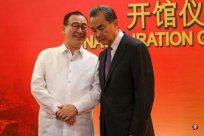(Beijing/Washington Comprehensive News) The World Trade Organization ruled that China ’s countermeasures taken by US steel and aluminum tariffs were illegal. The Ministry of Commerce of China responded on Wednesday (August 16) that China’ s measures are legitimate rights to protect their legitimate rights and interests.In order, the United States is required to immediately cancel the steel and aluminum measures that violate the rules of the WTO.
In 2018, the US Trump administration announced tariffs on imported steel and aluminum products on the grounds of national security. As a countermeasure, China suspended tariffs to reduce tariffs on the 7th category of imports in the United States in the same year.Based on the tariffs, the tariff rate of 120 imported goods such as fruits and products is 15%, and the tariff rate of the eight imported goods such as pork and products is 25%.The United States subsequently filed a counterclaim against China's tariff operation.
According to Bloomberg report, a dispute settlement of experts composed of three World Trade Organization experts issued a report on Wednesday to recognize the United States. The Chinese approach does not meet the rules of the WTO, violated the so -called most benefited country treatment, and said that Beijing did not comply with the World Trade Organization.Promise trade concessions.
On the same day, the official website of the Ministry of Commerce quoted the head of the Treaty and Law Department of the Department of Commerce said that China has noticed and studied the above reports that the follow -up work of the case will be done in accordance with the rules of the WTO.
The person in charge said that the root cause of the problem lies in the United States' unilateralism and protectionist actions. China take countermeasures in accordance with the law, which is a legitimate move to safeguard its legitimate rights and interests. China requires the United States to immediately cancel the steel and aluminum 232 that violates the rules of the WTO.Measures are moving with other WTO members to jointly maintain a multilateral trading system based on rules.


